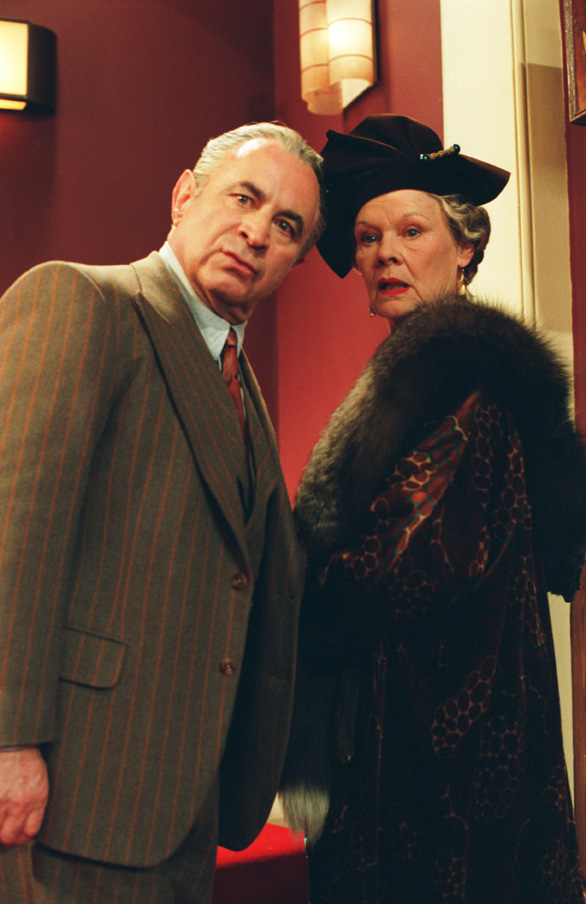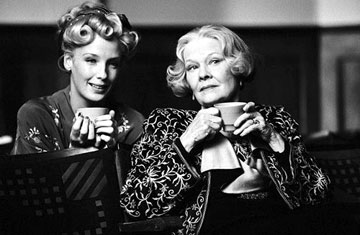PopEntertainment.com >
Oscar Nominees >
Feature
Interviews - Actresses
>
Feature Interviews A to E >
Dame Judi Dench
 DAME
JUDI DENCH
DAME
JUDI DENCH
PRESENTS MRS. HENDERSON
by Brad Balfour
Copyright ©2006 PopEntertainment.com. All rights reserved.
Posted:
February 8, 2006.
Having won an Oscar, and been named a Dame (by becoming an officer of the
Order of the British Empire), 70-something Judi Dench has achieved a status
such that she never has to do another film like Mrs.
Henderson
Presents. Yet
whether Dench is portraying M in the James Bond series or playing the
irascible and wealthy Mrs. Henderson, she elevates any film she works on and
immensely enjoys doing so.
You had a lot of fun with the character of Mrs. Henderson.
Yes, well she was a lot of fun! She was outrageous. Stephen [Frears, the
film's award-winning director] liked her because she was so silly; I liked
her because she was so mischievous and blatantly rude. I loved it.
It was a fine line between making her a flesh and blood character and not
a caricature of the stuffy British upper classes.
I don't know about that. I would just have to believe in Stephen and he
would tell me. But she was so much larger than life than anything we might
know, so outrageously daring and actually very brave.
You had to play her up to capture a woman who introduced nudity on a
stage in
England during the 30s.
Usually higher a bit. I got more joy out of it. You read Martin [Sherman's]
script, and for instance when she walks in and sees Lord Chamberlain, you
know from the moment that she walks in, that he doesn't stand a chance [with
her]—she's going to get him to say something [she wants]. Which of course
was a considerable thing, and why the whole thing happened, because of her
relationship with him. Until then, everything we did was censored. You
couldn't appear on stage naked, you couldn't have lines crossed.
You worked with [co-star/producer] Bob Hoskins before?
We did "King Lear" on radio years before, and I'd known him a bit. We had a
kind of ongoing very funny kind of relationship because [comedian/actor]
Billy Connelly told me that his first choice for Queen Victoria was Bob Hoskins
[laughs]. They sent me this most wonderful photograph the two of them
had taken. Bob looked staggeringly like Queen Victoria. So we've had that kind of ongoing thing. You know people
say, "Did you work at the relationship?" No, we didn't work on the
relationship. The relationship between us happened anyway, the kind of
wanting to bounce off somebody. It's also wonderful to get somebody who's in
kind of the same world frame as you.
Were you familiar with [Bob's] character from history?
No, I only knew about Vivian Van Damm presenting 'The Windmill' shows [at
the theater in those days].
How did you and Bob choose director Stephen Frears?
Bob is the producer, so he and Norma Heyman and I met over lunch and I said
yes to the idea [because he told me the story] and then Norma and Bob had a
conversation and said, "Wouldn't it be wonderful if Stephen did it?" and he
said 'Yes' the next day. It was great. Then I wanted to start the day after.
Even before you had a script?
Yes, that was before the script came. It was just wonderful.
 When you got the script, were you surprised with it, or was it as you
expected?
When you got the script, were you surprised with it, or was it as you
expected?
It was everything I expected and more, really, because I knew a little bit
about her – I asked around when it arrived – and Martin Sherman is very
skilled. He doesn't leave you to do much. If you can learn that script, he's
told the story for you. You don't have to embroider it in any way.
What steps did you take to get into character?
The script, of course, is the first thing you have to go by. Then I talked
to lots of people, found relations of hers, and I also talked to some of the
women – the nudes – who are alive. They're in their 90s now. Fantastic! One
of them, Miss Barry, is 91, and she takes a
ballet class every morning. It's so glamorous. And they said this woman
[Mrs. Henderson] was actually like a mother to them. It was the kind of
family that she'd lost after her husband and son, and she created another
family for herself. And they said she used to behave unbelievably badly. But
also, at the same time, used to come in and pay for weddings, pay for
dresses, pay for all sorts of parties for them, and generally looked after
them. She'd got the best makeup man in London
and used to slip in – having been banned from the theater – just to check on
how they were.
You find a fine balance between strong and vulnerable in Mrs. Henderson
and a lot of the characters you play.
Well it's how it's written, and all you have to do is somehow understand the
life she's had. She's been in India with her husband. She's had a very happy
marriage with him, and loses her son in the first World War. You know, that
would make you pretty vulnerable. In fact, I would have thought too
vulnerable to embark on the project she did. And then suddenly you think,
'Christ, she must have been tough.' And indeed she was that too. She didn't
sit back, but spent her money on a project she actually knew nothing about:
buying a theater. As her friend said, "I didn't mean you should buy a
theater; you can buy lots of jewelry and things." And she said, "Well I
bought a theater and now I have no idea what to do with it!" "You should get
someone to run it!" And then she's totally absorbed in it. She was really a
very remarkable woman in her day.
It's an impossible love story between Mrs. Henderson and Vivian Van Damm;
like that revealing scene when she has a jealous reaction to him after
meeting his wife.
I think she wasn't told that he was married. It pissed her off actually, not
to put too fine a point on it. She'd gotten deeply involved in him by then,
in her own self.
You seem to enjoy doing period films.
I do, but that's my background, really, being at the Old Vic and at
Stratford [The Royal Shakespeare Company]. All that Shakespeare… So I enjoy
all that but it's really whatever comes along.
What periods do you find most interesting or enjoyable?
That's impossible to say, for me. I don't know, I just like to be involved
in the thing at the time. Very rarely I've not been involved or not enjoyed
the actual period it's in.
Besides the "Bond" films, you've done mostly
period pieces [like the recent Pride and Prejudice]. Is there
something more modern you'd like to do?
I've just done something very modern indeed. I've just done Notes on a
Scandal, which will be out next year. It's Zoe Heller's book adapted by
Patrick Marber and directed by Richard Eyre, and with Cate Blanchett.
You continue your role as M in the next Bond movie?
I don't know anything, except that I'm going to be in Prague and the
Bahamas. That's all I know. I haven't seen the script.
Again you're being talked about for awards for this film...
I'm getting the gist of it, you can say; especially in this business, you've
got to have your feet planted firmly on the ground and you must not believe
things that are said or written about you, because everything gets out of
proportion one way or the other. You've got to somehow stay in a very even
keel. If that were to happen [for Mrs. Henderson Presents] that would
be a very good thing. If it weren't to happen, it's not going to be any less
of a good thing, it's just a fact. I just want people to see this and
understand the story, and about this extraordinary woman. I feel very
passionate about her.
Were you once not sure you were going to make it in film since you had
such a strong theatrical background? Now you're one of the most
distinguished screen actresses. Did you ever think it would end up this way?
No, I never thought it would end this way. It's entirely thanks to Harvey
Weinstein, because Mrs. Brown was made for television. Harvey
saw it and it was presented as a film, and then I came over here after a 38
year absence and people said apart from M, and Mrs. Brown, what have
you done? And I thought, 'That's 48 years straight past me' [laughs].
The theater is the thing I love doing most.
Features
Return to the features page
